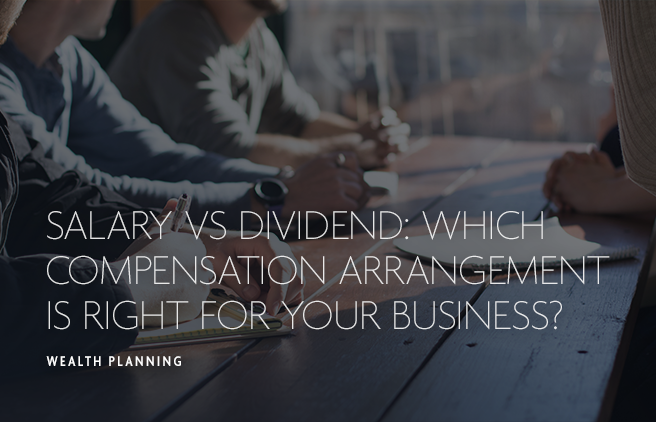
Salary vs Dividend: Which Compensation Arrangement is Right for Your Business?
As a business owner, one of the important decisions you’ll need to make is how to compensate yourself for the services you provide to your company. Should you take a salary or dividends? Both have their own set of pros and cons, and the right choice will depend on your individual circumstances.
Salary Compensation:
- Deductible to your corporation and fully taxable to you
- CPP contributions are mandatory
- Generates RRSP room equal to 18% of your previous year’s salary
- Gives you the option to start an Individual Pension Plan (IPP) later
- Helpful to prove income to third parties (for personal loan applications, disability insurance, etc)
Dividend Compensation:
- Not deductible to the corporation
- No CPP contributions allowed
- Do not generate RRSP room
- Are taxed lower than salary in your hands but offset by tax paid by the corporation
- Can end up putting you on tax instalments
In recent years, there have also been significant changes to small business taxation, specifically regarding the passive income grind, tax on split income (TOSI) and the splitting of RDTOH into NERDTOH and ERDTOH. The income streams of incorporated business owners seem to be under significant scrutiny, so who knows what other changes will come down the pike.
Good retirement planning involves diversification not only within your portfolio but also your income sources. Tax planning diversification reduces the risk of regime changes blowing up your retirement plan. That risk can be diversified away.
For most people, the salary / dividend debate won’t make or break their financial plans. So, if you can reach your goals in the least risky way, you should pursue that direction.
Some helpful questions to ask yourself:
- What are my retirement plans?
- What is my current and future tax bracket?
- What is the cash flow situation of my company?
- How important is contributing to CPP to me?
- How will my choice affect the overall tax efficiency of my compensation?
Ultimately the choice between salary and dividend compensation will depend on your individual circumstances. It’s important to consult with a tax professional or accountant before making a decision to ensure that the choice you make is the right one for you and your business.
As a business owner, one of the important decisions you’ll need to make is how to compensate yourself for the services you provide to your company. Should you take a salary or dividends? Both have their own set of pros and cons, and the right choice will depend on your individual circumstances.
Salary Compensation:
- Deductible to your corporation and fully taxable to you
- CPP contributions are mandatory
- Generates RRSP room equal to 18% of your previous year’s salary
- Gives you the option to start an Individual Pension Plan (IPP) later
- Helpful to prove income to third parties (for personal loan applications, disability insurance, etc)
Dividend Compensation:
- Not deductible to the corporation
- No CPP contributions allowed
- Do not generate RRSP room
- Are taxed lower than salary in your hands but offset by tax paid by the corporation
- Can end up putting you on tax instalments
In recent years, there have also been significant changes to small business taxation, specifically regarding the passive income grind, tax on split income (TOSI) and the splitting of RDTOH into NERDTOH and ERDTOH. The income streams of incorporated business owners seem to be under significant scrutiny, so who knows what other changes will come down the pike.
Good retirement planning involves diversification not only within your portfolio but also your income sources. Tax planning diversification reduces the risk of regime changes blowing up your retirement plan. That risk can be diversified away.
For most people, the salary / dividend debate won’t make or break their financial plans. So, if you can reach your goals in the least risky way, you should pursue that direction.
Some helpful questions to ask yourself:
- What are my retirement plans?
- What is my current and future tax bracket?
- What is the cash flow situation of my company?
- How important is contributing to CPP to me?
- How will my choice affect the overall tax efficiency of my compensation?
Ultimately the choice between salary and dividend compensation will depend on your individual circumstances. It’s important to consult with a tax professional or accountant before making a decision to ensure that the choice you make is the right one for you and your business.





